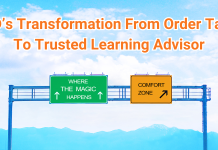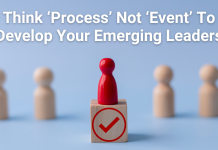
How do you take the plunge and pursue your dream job?
Becoming an entrepreneur is an incredibly challenging journey. All decisions fall to you, for better or worse, and you have to lead by example while maintaining a strong vision on your goals. So what do aspiring entrepreneurs need in order to arm themselves for the rough road to success?
Monica Klausner is the co-founder, along with her brother, of a meal delivery service called Veestro. Although she and her brother always loved the social aspect of sharing a great meal, as adults, they found that office life meant little time to cook, little time to prepare a healthy meal. This is how they came up with the idea of Veestro.com – healthy, plant-based meals, ready to heat and eat. I recently interviewed Monica for the LEADx Podcast, where we discussed health, success, and starting a business. (The interview below has been lightly edited for space and clarity.)
Kevin Kruse: If I go to Veestro.com, what happens?
Monica Klausner: What happens is you come to Veestro, and you are presented with all of these pictures of amazingly delicious food. You want to take a look at the meals that we offer. They're all healthy. They're all made with 100% plants because everybody needs to eat more plants, but the best thing about our meals are that they are delicious and fully prepared.
You come to our site, you take a look around. If you've never been here, I always tell people, always start with our starter pack. Our starter pack is 12 meals. They're the most popular meals, so you know that everybody loves those. It's 12 meals and a juice. It's usually $99, and it includes free shipping for first-time customers.
The reason I say start with that is because sometimes you come to the site, you see 50 images of delicious meals. “Oh my God. Where do I go from here? How do I even make a choice?” Start with the starter pack: twelve different meals. They're all delicious. They're fully prepared. What happens once you place your order is we make everything fresh throughout the week, and then we ship it to you frozen. The reason we ship it to you frozen is because I can only imagine how busy you are, Kevin, being a single dad of three teenagers. Everybody's busy, even if you don't have any children, if you're a young millennial professional.
The box arrives at your doorstep frozen. You open it, you put all the meals in the freezer. They're there for when you need them so you don't have to worry that by Saturday, they'll be bad. If you didn't get to them this week because you were out of town on a business trip, it's not a big deal. They can last up to eight weeks in your freezer, and all you do is you get home, you take one out of the freezer. You can pop it in the oven. You can toss it in the skillet. You can always use a microwave in a pinch. A lot of people don't like it, but it's there for convenience, and 15, 20 minutes later, your dinner is done. There's no prepping, no chopping, no cooking, and certainly no cleaning. That's my favorite part.
Kruse: Your meals could be described as vegan, but you use the term ‘plant-based.’ Is there a reason for that?
Klausner: There is, actually, and I'm so glad you asked. The reason we use the word ‘plant-based’ instead of vegan is because my brother and I, we truly believe that eating more plants is a much healthier way to live, but what we want to convey with Veestro is that you don't have to be an absolute vegan. You don't have to be vegan to eat more plants.
You can be a carnivore, an omnivore, a flexitarian, a pescitarian, a milkitarian, you can be anything you want to call yourself, but everybody needs to eat more plants because it's better for their health, it's better for the environment, and ultimately, if we want to be able to live on this Earth for many more generations, we all have to do our part. Not to mention the fact that there's all of these horrible chronic illnesses in the US and around the world—but more prominently in the US—that can really be helped with better nutrition.
When we started the business, we decided that we wanted to encourage people to eat more plants. How do you do that without making them feel excluded? It's pretty unfortunate that the vegan movement of yore, if you will, did something that has turned out to be not very inclusive, which is that it makes people feel like if you're not a vegan, you just might as well not even try.
It's a real shame. We can all do our part. I mean, look, there's meatless Mondays. There's the new reducetarian solution, which all it does is it talks about how we can all reduce the amount of animal products we consume. It's not saying get rid of them. It just says eat less. Eat more plants.
Kruse: Although I eat vegan probably 95% of the time, the other 5% of my diet looks like a Super Bowl party.
Klausner: It's okay. Everybody should feel that way, Kevin. Everybody should feel okay with the way that they eat as long as they're happy with the way they eat. If you're happy having a 5% Super Bowl diet, dude, you are doing so much more for yourself and for the environment than 90% of the population.
Kruse: People complain about wanting to change their careers, but they won't pivot. Tell me about how you did it.
Klausner: Well, I want to start by saying that entrepreneurship is not for the faint of heart. Let's start with that. If you are one of those people who loves having the security of a job, then that's awesome, and more power to you.
If, on the other hand, you have this little tickle in the back of your head that says, “I really, I want to, I should be,” it is really scary. There are so many emotions that you go through. It's scary because you go from security to no security. It's exciting because you go from something that you know how to do to something that you've never tried or maybe you don't know if it's going to work. It's nerve-wracking because all of a sudden, it's all on you, and you cannot just leave it. You cannot just quit. I mean, you can, but really, you don't want to just quit.
There's all of these emotions, and I have to tell you, the emotions don't really change. As your business grows, it shifts. The fear is still there, but now, we don't have the fear of, “Oh my God, is this business going to work?” Like it used to be at the beginning. Now, the fear is, “Oh my God, are we going to be able to hit our numbers this year?” and next year, it's going to be, “Wow, are we going to be able to raise the amount of money we want to raise so that we can hit the next level?”
It just shifts, and you have to be okay with all of these emotional roller-coasters. Now, the upside of that is that you feel so great at the end of the day because it doesn't matter how tired or stressed you are, this is your own thing, and you're affecting your future. You are officially running your own ship.
The other thing I wanted to tell you is that—this is more for your listeners—when you have that tickle in the back of your head to be an entrepreneur, it doesn't mean you have to start a hundred million-dollar company.
It also doesn't mean you have to start a ten million-dollar company. A lot of people start businesses that are small and that are ‘lifestyle businesses.’ My family, for example, we grew up in Costa Rica, and everyone in my family is an entrepreneur, but their businesses are all lifestyle businesses.
What that means is you build a business that you can live off of. It's your own business. You make enough money to live a nice life, but you don't have the stresses of having to raise funds, talk to investors, have a public company, all of those things that come with a really large business, and that's great as well.
Kruse: Even the iconic entrepreneurs like Elon Musk or Michael Dell face huge problems everyday. It goes with the territory.
Klausner: Absolutely. That's why I say it's not for the faint of heart. If you think you're going to start a business and it's going to be multi-million dollar success overnight, and then you're going to be able to lay on a beach somewhere, you're probably not being very realistic. It doesn't usually work that way.
Kruse: How are you guys attracting great people and keeping them engaged at work?
Klausner: That's the million-dollar question, and it changes on a daily basis, but I think what my brother and I have been able to hone in on—remember when I said entrepreneurship is not for the faint of heart, right?
Well, working at a startup is also not for the faint of heart.
For Mark and I, when we look at talent, one of the most important things for us, something that is almost a deal breaker, in fact, is the person needs to be willing to do what it takes to work here.
What that means is, we run a food business, and so maybe on a certain day two of the shippers don’t show up. They were sick. Somebody's gotta step in and suit up and go into the freezer for eight hours a day. Sometimes that person is me.
But we need to have people who are willing to roll up their sleeves, get their hands dirty in whatever needs to be done. The upside of that is that a lot of our employees have learned many different aspects of our business, so they're much more well-rounded. Their perspective on work is very different, and it's exciting because it gives them a really big sense of ownership. “I'm not just working here. This isn't just a job. I'm actually making an impact and helping the business grow.”
I would say before we look at resumes, before we look at where they went to school, before we look at anything else, we want to have a sit down with the person and sort of gauge. Is this person somebody who's willing to do what it takes?
Kruse: They will invest time, sweat, and energy to build things that they feel like they own.
Klausner: Alternatively, we're building a really nice culture of cooperation. We all collaborate. We all talk. We do lunches. Whenever, because we work in food, every time there's a new menu item that we're considering putting on the menu, the chef brings it out. Everybody gets to try it, everybody gets a questionnaire, everybody gets to give some input, and so everybody feels like they are really part of the lifeline of the business. I think that makes a big difference in how people feel when they come to work.
Kruse: I like to challenge our listeners to become 1% better every day. What's one specific thing we can do today to advance our careers?
Klausner: If I can tell you only one thing that has made a significant impact in my career is shifting my perception.
Shift your perspective, if you will, in a more positive way. If you are the kind of person who thinks the glass is always half empty, meaning, “Oh, my job sucks. This is terrible. I don't like it here,” shift your perspective and think—this is going to sound just like JFK—“Think not what your country can do for you, but what you can do for your country.” Think about how you can make this situation better. Give 110% of yourself, not for the people around you, but for yourself because when you feel better, you feel more empowered to do better.
One more challenge: If you can do anything, just eat less animal products. Whatever it is, eat more plants. One day, one meal, it doesn't matter.
—
Kevin Kruse is a New York Times bestselling author, host of the popular LEADx Leadership Podcast, and the CEO/Founder of LEADx.org, which provides free world-class leadership training, professional development and career advice for anyone, anywhere.





